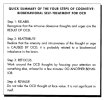I too can be a "dopamine addict". Sometimes I take the easy route and look for a quick and easy fix. It can be watching youtube videos, or eating some 100% chocolate. But I haven't been doing those things lately.
Yesterday I was a little hungry after eating and cut off two or three tablespoons of butter. It seemed like I needed more fat. That wasn't binging, and I'll sometimes eat more fat if I feel less than satiated. But chocolate with xylitol can pile on the carbs and gives an insulin spike. I'm trying smoking again, and today the traffic was pretty bad, and even though I had one already this morning, I pulled out a cig and it helped with the stress. I'm looking into myo-inositol powder to help with serotonin, but it is a carb so I will see how that goes when I get some.
Yesterday I was a little hungry after eating and cut off two or three tablespoons of butter. It seemed like I needed more fat. That wasn't binging, and I'll sometimes eat more fat if I feel less than satiated. But chocolate with xylitol can pile on the carbs and gives an insulin spike. I'm trying smoking again, and today the traffic was pretty bad, and even though I had one already this morning, I pulled out a cig and it helped with the stress. I'm looking into myo-inositol powder to help with serotonin, but it is a carb so I will see how that goes when I get some.

 . I found when I was transitioning out of a carb based diet, when cravings arose instead of indulging I would eat a big tablespoon of coconut oil and that seemed to satiate the craving (good fat), some days were better than others but after a few months the cravings were less often and less intense. The Four step method developed by Dr. Schwartz can be really helpful when your in that 'addictive moment', helping to identify where the compulsive and self harming pattern originates. Keep at it moment by moment day by day!
. I found when I was transitioning out of a carb based diet, when cravings arose instead of indulging I would eat a big tablespoon of coconut oil and that seemed to satiate the craving (good fat), some days were better than others but after a few months the cravings were less often and less intense. The Four step method developed by Dr. Schwartz can be really helpful when your in that 'addictive moment', helping to identify where the compulsive and self harming pattern originates. Keep at it moment by moment day by day!